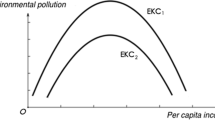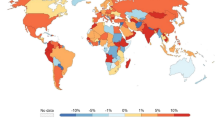Abstract
Tourism is a significant economic growth and development source, but it relies heavily on the energy sector and contributes to carbon dioxide (CO2) emissions. This study examines how tourism growth, renewable energy, and real GDP affect CO2 emissions in the BRICS countries. The researchers used panel unit root, Pedroni, and Kao methods to test for a long-run equilibrium relationship among the variables. The results reveal that tourism growth harms CO2 emissions in the long run, with a 1% increase in tourism growth leading to a 0.05% decrease in CO2 emissions. Renewable energy usage also harms CO2 emissions, with a 1% increase in renewable energy leading to a 0.15% decrease in CO2 emissions in the long run. CO2 emissions and real GDP show a U-shaped relationship in the long run, supporting the environmental Kuznets curve hypothesis. This hypothesis suggests that CO2 emissions increase with economic growth at low-income levels but decrease with economic growth at high-income levels. Therefore, the study implies that tourism growth can significantly lower CO2 emissions by promoting renewable energy usage and economic development.



Similar content being viewed by others
References
Abbasi T, Premalatha M, Abbasi S (2011) The return to renewables: will it help in global warming control? Renew Sust Energ Rev 15(1):891–894
Ahmad N, Du L, Tian X-L, Wang J (2019) Chinese growth and dilemmas: modeling energy consumption, CO 2 emissions and growth in China. Qual Quant 53:315–338
Ahmad B, Iqbal S, Hai M, Latif S (2022). The interplay of personal values, relational mobile usage and organizational citizenship behavior. Interactive Technology and Smart Education 19(2):260–280
Al-Mulali U, Fereidouni HG, Mohammed AH (2015) The effect of tourism arrival on CO2 emissions from the transportation sector. Anatolia 26(2):230–243
Arbulú I, Lozano J, Rey-Maquieira J (2015) Tourism and solid waste generation in Europe: a panel data assessment of the environmental Kuznets curve. Waste Manage 46:628–636
Becken S, Simmons DG, Frampton C (2003) Energy use associated with different travel choices. Tour Manag 24(3):267–277
Ben Jebli M, Hadhri W (2018) The dynamic causal links between CO2 emissions from transport, real G.D.P..P., energy use and international tourism. Int J Sustain Dev World Ecol 25(6):568–577
Bilal AR, Fatima T, Iqbal S, Imran MK (2022). I can see the opportunity that you cannot! A nexus between individual entrepreneurial orientation, alertness, and access to finance. Eur Bus Rev 34(4):556–577
Breitung J (2001) The local power of some unit root tests for panel data. In: Nonstationary panels, panel cointegration, and dynamic panels, vol 15. Emerald Group Publishing Limited, pp 161–177
Chang L, Iqbal S, Chen H (2023). Does financial inclusion index and energy performance index co-move?. Energy Policy 174:113422
Chim-Miki AF, Batista-Canino RM (2017) The coopetition perspective applied to tourism destinations: a literature review. Anatolia 28(3):381–393
Chien F, Hsu CC, Zhang Y, Sadiq M (2023) Sustainable assessment and analysis of energy consumption impact on carbon emission in G7 economies: mediating role of foreign direct investment. Sustain Energy Technol Assess 57:103111
Choi I (2001) Unit root tests for panel data. J Int Money Finance 20(2):249–272
De Freitas C (2017) Tourism climatology past and present: a review of the role of the I.S.B..B. Commission on Climate, Tourism and Recreation. Int J Biometeorol 61:107–114
Dickinson JE, Lumsdon LM, Robbins D (2011) Slow travel: issues for tourism and climate change. J Sustain Tour 19(3):281–300
Dogan E, Seker F, Bulbul S (2017) Investigating the impacts of energy consumption, real G.D.P..P., tourism and trade on CO2 emissions by accounting for cross-sectional dependence: a panel study of O.E.C.D. countries. Curr Issues Tour 20(16):1701–1719
Dube K, Nhamo G (2018) Climate variability, change and potential impacts on tourism: evidence from the Zambian side of the Victoria Falls. Environ Sci Policy 84:113–123. https://doi.org/10.1016/j.envsci.2018.03.009
Epstein PR, Buonocore JJ, Eckerle K, Hendryx M, Stout Iii BM, Heinberg R, Clapp RW, May B, Reinhart NL, Ahern MM (2011) Full cost accounting for the life cycle of coal. Ann N Y Acad Sci 1219(1):73–98
Im KS, Pesaran MH, Shin Y (2003) Testing for unit roots in heterogeneous panels. J Econom 115(1):53–74
International Energy Agency I. E. A, Bank, W (2014) Sustainable Energy for All 2013-2014: Global Tracking Framework Report. The World Bank
Iqbal S, Bilal AR, Nurunnabi M, Iqbal W, Alfakhri Y, Iqbal N (2021). It is time to control the worst: testing COVID-19 outbreak, energy consumption and CO 2 emission. Environ Sci Pollut Res. 28:19008–19020
Iqbal S, Bilal AR (2021). Energy financing in COVID-19: how public supports can benefit?. China Finance Review International 12(2):219–240
Jiang J-J, Ye B, Zhou N, Zhang X-L (2019) Decoupling analysis and environmental Kuznets curve modelling of provincial-level CO2 emissions and economic growth in China: a case study. J Clean Prod 212:1242–1255
Kao C, Chiang M-H (2001) On the estimation and inference of a cointegrated regression in panel data. In: Nonstationary panels, panel cointegration, and dynamic panels, vol 15. Emerald Group Publishing Limited, pp 179–222
Katircioglu S, Saqib N, Katircioglu S, Kilinc CC, Gul H (2020) Estimating the effects of tourism growth on emission pollutants: empirical evidence from a small island, Cyprus. Air Qual Atmos Health 13:391–397
Katircioglu ST (2014) International tourism, energy consumption, and environmental pollution: the case of Turkey. Renew Sust Energ Rev 36:180–187
Lee C-C, Chang C-P (2008) Tourism development and economic growth: a closer look at panels. Tour Manag 29(1):180–192
Lee JW, Brahmasrene T (2013) Investigating the influence of tourism on economic growth and carbon emissions: evidence from panel analysis of the European Union. Tour Manag 38:69–76
Levin A, Lin C-F, Chu C-SJ (2002) Unit root tests in panel data: asymptotic and finite-sample properties. J Econom 108(1):1–24
Li W, Chien F, Ngo QT, Nguyen TD, Iqbal S, Bilal AR (2021). Vertical financial disparity, energy prices and emission reduction: empirical insights from Pakistan. J Environ Manage 294:112946
Maddala GS, Wu S (1999) A comparative study of unit root tests with panel data and a new simple test. Oxf Bull Econ Stat 61(S1):631–652
Michailidou AV, Vlachokostas C, Moussiopoulos Ν (2016) Interactions between climate change and the tourism sector: multiple-criteria decision analysis to assess mitigation and adaptation options in tourism areas. Tour Manag 55:1–12
Naradda Gamage SK, Hewa Kuruppuge R, Haq I, u. (2017) Energy consumption, tourism development, and environmental degradation in Sri Lanka. Energy Sources B: Econ Plan Policy 12(10):910–916
Paramati SR, Shahbaz M, Alam MS (2017) Does tourism degrade environmental quality? A comparative study of Eastern and Western European Union. Transp Res D Transp Environ 50:1–13
Pedroni P (2004) Panel cointegration: asymptotic and finite sample properties of pooled time series tests with an application to the P.P.P.P. hypothesis. Econ Theory 20(3):597–625
Popp J, Lakner Z, Harangi-Rákos M, Fari M (2014) The effect of bioenergy expansion: food, energy, and environment. Renew Sustain Energy Rev 32:559–578
Rauf A, Liu X, Amin W, Ozturk I, Rehman OU, Sarwar S (2018) Energy and ecological sustainability: challenges and panoramas in belt and road initiative countries. Sustainability 10(8):2743
Raza SA, Sharif A, Wong WK, Karim MZA (2017) Tourism development and environmental degradation in the United States: evidence from wavelet-based analysis. Curr Issues Tour 20(16):1768–1790
Sadiq M, Lin CY, Wang KT, Trung LM, Duong KD, Ngo TQ (2022) Commodity dynamism in the COVID-19 crisis: are gold, oil, and stock commodity prices, symmetrical? Resour Policy 79:103033
Sharif A, Afshan S, Nisha N (2017) Impact of tourism on CO2 emission: evidence from Pakistan. Asia Pac J Tour Res 22(4):408–421
Simpson MC, Gössling S, Scott D, Hall CM, Gladin E (2008) Climate change adaptation and mitigation in the tourism sector: frameworks, tools and practices. Climate change adaptation and mitigation in the tourism sector: frameworks, tools and practices
Sun L, Fang S, Iqbal S, Bilal AR (2022). Financial stability role on climate risks, and climate change mitigation: implications for green economic recovery. Environ Sci Pollut Res 29(22):33063–33074
Tang C, Zhong L, Ng P (2017) Factors that influence the tourism industry’s carbon emissions: a tourism area life cycle model perspective. Energy Policy 109:704–718
Tian X-L, Bélaïd F, Ahmad N (2021) Exploring the nexus between tourism development and environmental quality: role of renewable energy consumption and Income. Struct Chang Econ 56:53–63
Tu CA, Chien F, Hussein MA et al (2021). Estimating role of green financing on energy security, economic and environmental integration of BRI member countries. Singap Econ Rev 1–19
Wang S, Sun L, Iqbal S (2022). Green financing role on renewable energy dependence and energy transition in E7 economies. Renew Energy. 200:1561–1572
Wu S, Lei Y, Li S (2019) CO2 emissions from household consumption at the provincial level and interprovincial transfer in China. J Clean Prod 210:93–104
Yang Y, Liu Z, Saydaliev HB, Iqbal S (2022). Economic impact of crude oil supply disruption on social welfare losses and strategic petroleum reserves. Resour Policy 77:102689
Zaman K, Shahbaz M, Loganathan N, Raza SA (2016) Tourism development, energy consumption and environmental Kuznets curve: trivariate analysis in the panel of developed and developing countries. Tour Manag 54:275–283
Zhang J, Zhang Y (2021) Tourism, economic growth, energy consumption, and CO2 emissions in China. Tour Econ 27(5):1060–1080
Zhang L, Huang F, Lu L, Ni X, Iqbal S (2022). Energy financing for energy retrofit in COVID-19: recommendations for green bond financing. Environ Sci Pollut Res 29(16):23105–23116
Zhao L, Saydaliev HB, Iqbal S (2022). Energy financing, COVID-19 repercussions and climate change: implications for emerging economies. Climate Change Economics 13(03):2240003
Zheng X, Zhou Y, Iqbal S (2022). Working capital management of SMEs in COVID-19: role of managerial personality traits and overconfidence behavior. Econ Anal Policy 76:439–451
Availability of data and materials
The data that support the findings of this study are openly available on request.
Author information
Authors and Affiliations
Contributions
Conceptualization, methodology, and writing—original draft: Dong Weng. Data curation, visualization, and editing: Wanxin Sun.
Corresponding author
Ethics declarations
Ethical approval and consent to participate
The authors declared that they have no known competing financial interests or personal relationships, which seem to affect the work reported in this article. We declare that we have no human participants, human data, or human issues.
Consent for publication
We do not have any individual person’s data in any form.
Competing interests
The authors declare no competing interests.
Additional information
Responsible Editor: Arshian Sharif
Publisher’s note
Springer Nature remains neutral with regard to jurisdictional claims in published maps and institutional affiliations.
Rights and permissions
Springer Nature or its licensor (e.g. a society or other partner) holds exclusive rights to this article under a publishing agreement with the author(s) or other rightsholder(s); author self-archiving of the accepted manuscript version of this article is solely governed by the terms of such publishing agreement and applicable law.
About this article
Cite this article
Weng, D., Sun, W. Tourism development influence on environmental quality: how renewable energy use and income matter?. Environ Sci Pollut Res 30, 87228–87241 (2023). https://doi.org/10.1007/s11356-023-28001-1
Received:
Accepted:
Published:
Issue Date:
DOI: https://doi.org/10.1007/s11356-023-28001-1




